Is Rob Ford on the ropes? Let’s hope so .. What might help him most now? A loss, not a victory, in Court
Sep 17th, 2012 | By West Side Noel | Category: In Brief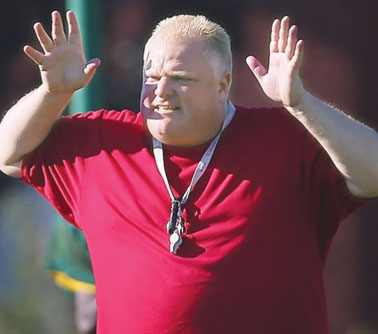 This morning I opened the papers to another installment of the Rob Ford saga. It seems the Mayor of Toronto (Canada’s most hated city etc) and his brother, Councillor Doug Ford, were on their Sunday radio program trying to push back against allegations of the Mayor’s misuse of City staff and resources for his football coaching activities.
This morning I opened the papers to another installment of the Rob Ford saga. It seems the Mayor of Toronto (Canada’s most hated city etc) and his brother, Councillor Doug Ford, were on their Sunday radio program trying to push back against allegations of the Mayor’s misuse of City staff and resources for his football coaching activities.
Those allegations emerged last week and may have created real problems for the Mayor with his base. Former Ford staffers were quoted in the Toronto Star on Friday as saying that the Mayor’s advisers had warned him early on in his term not to use city cars and phones and paid city staff to help him with his football coaching of the Don Bosco Catholic Secondary School Eagles and Rexdale Raiders. The fact that Ford may have been doing just that had come to light after Ford made an early exit from the City’s Executive Committee meeting Monday September 10 to accompany the Don Bosco team to a scrimmage jamboree.
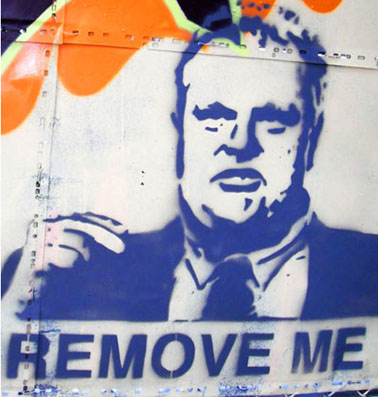 Why were his advisers so concerned? Because unlike all the other Ford embarrassments, using city resources to help coach football had the potential to alienate his core supporters. “This is the one type of thing that could actually piss off Ford Nation, because it goes against the bedrock principle of not dipping into the trough” said one former staffer. Another ex-staffer put it this way: Ford’s use of city resources and staff would be availing himself of “gravy.” That’s a no-no. Ford’s condemnation of the alleged “gravy train” at City Hall was the centerpiece of his successful 2010 campaign for the Mayoralty, so even elements of his bedrock support might see this as serious hypocrisy. But as we now know, Ford ignored the advice and kept on with what apparently was the same old same old.
Why were his advisers so concerned? Because unlike all the other Ford embarrassments, using city resources to help coach football had the potential to alienate his core supporters. “This is the one type of thing that could actually piss off Ford Nation, because it goes against the bedrock principle of not dipping into the trough” said one former staffer. Another ex-staffer put it this way: Ford’s use of city resources and staff would be availing himself of “gravy.” That’s a no-no. Ford’s condemnation of the alleged “gravy train” at City Hall was the centerpiece of his successful 2010 campaign for the Mayoralty, so even elements of his bedrock support might see this as serious hypocrisy. But as we now know, Ford ignored the advice and kept on with what apparently was the same old same old.
If the commentary in the mainstream media is any indication, those advisors were right. I could find only criticism of the Mayor on this topic in Toronto’s major dailies. Even Toronto Sun columnist Sue-Ann Levy, arguably his biggest media supporter, went after the Mayor on this one. So too did another staunch ally, the Canadian Taxpayers Federation.
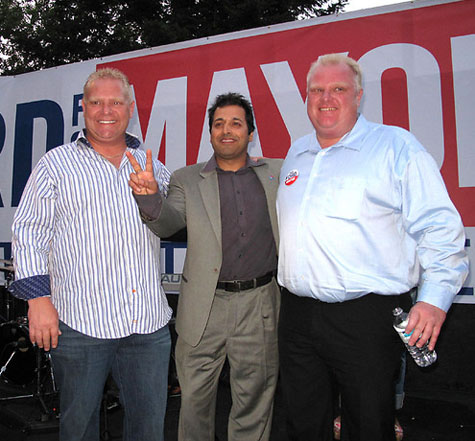 A further sign that this was trouble was the fact that the comment sections lacked the usual vociferous pro-Ford pushback to any criticism of the Mayor. Ford Nation indeed seemed to be having a tough time with this one. Dan Peat, who is the bureau chief for the Ford-positive Toronto Sun, did a live chat on the Mayor’s staff’s role in helping him with the coaching. It was on the Sun’s website between 11 AM and noon on Friday, September 14. During the chat, he put up the question “would you vote for Rob Ford for mayor in 2014”. The result: “Yes” 12% “No” 88% . Not a scientific poll, to be sure, but maybe the sign of the beginnings of a shift.
A further sign that this was trouble was the fact that the comment sections lacked the usual vociferous pro-Ford pushback to any criticism of the Mayor. Ford Nation indeed seemed to be having a tough time with this one. Dan Peat, who is the bureau chief for the Ford-positive Toronto Sun, did a live chat on the Mayor’s staff’s role in helping him with the coaching. It was on the Sun’s website between 11 AM and noon on Friday, September 14. During the chat, he put up the question “would you vote for Rob Ford for mayor in 2014”. The result: “Yes” 12% “No” 88% . Not a scientific poll, to be sure, but maybe the sign of the beginnings of a shift.
As much as Ford may want the issue of his questionable use of city staff and resources to fade permanently from view, that probably isn’t going to happen. A complaint on this very matter was filed with Janet Leiper, the City’s Integrity Commissioner by a Toronto resident on Thursday September 13. So even if the Mayor were to do a 180 with a mea culpa, the issue will be in the news again when Ms. Leiper comes back to City Council with her report on the complaint.
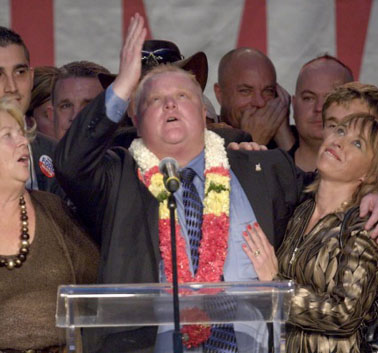 Can Ford bounce back? Obviously one way to handle the problem would be to provide an effective rebuttal to the charges of misuse. But there is no sign of that yet. So far, the Mayor has refused to give specifics, stonewalling reporters’ questions and providing nothing of substance on Sunday’s radio show.
Can Ford bounce back? Obviously one way to handle the problem would be to provide an effective rebuttal to the charges of misuse. But there is no sign of that yet. So far, the Mayor has refused to give specifics, stonewalling reporters’ questions and providing nothing of substance on Sunday’s radio show.
It’s early days yet; after all, it’s two years until the 2014 election and lots could happen. But the Mayor has shown clearly that he has a very hard time changing those habits that continue to get him in trouble. So I hazard to suggest the key to a potential comeback may lie in the court case that put him in the spotlight for the latest series of mayoral episodes. (And here Ford opponents should be hoping that he wins, legally at least!)
Will the Judge Force A Ford Recall? … Ford Opponents: Be Careful Of What You Wish For
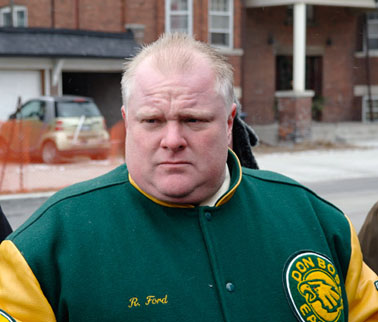 Back on September 5 the Mayor was in court to defend himself against an action brought by Paul Magder (no not the furrier who was at the centre of Sunday shopping litigation 30 or so years ago), a private citizen, under the Ontario’s Municipal Conflict of Interest Act. As we know from the dense media coverage, he will lose his job if he loses the case. I hope Rob Ford wins.
Back on September 5 the Mayor was in court to defend himself against an action brought by Paul Magder (no not the furrier who was at the centre of Sunday shopping litigation 30 or so years ago), a private citizen, under the Ontario’s Municipal Conflict of Interest Act. As we know from the dense media coverage, he will lose his job if he loses the case. I hope Rob Ford wins.
There I’ve gone and said something I never thought would pass my lips: “I hope Rob Ford wins.”
When I think of Rob Ford’s turn as Toronto’s mayor, words like “embarrassment” “joke” and “disaster” come to mind. Everything he did during his court appearance only reinforced that depiction. So why wouldn’t I want presiding Judge Charles Hackland to extract him from office? Two reasons:
* I don’t think what the court action accuses him of doing merits his removal as a duly elected public official. Election results are too important to be reversed without very serious justification and in this case that justification is just not there, despite what the law may or may not (turn out to) say. I think he would have to be guilty of more before he could be appropriately yanked from the job.
* Ford’s removal from office would give him an issue all nicely dressed up and dripping with demagogic potential to get on high C and go to political war. His re-election chances would jump up, perhaps entirely reversing the effect of the beating he’s currently taking in the media. I come down with cold sweats at the very thought of Toronto having a re-elected Mayor Rob Ford.
This prospect has got me a little upset, worried enough to try to figure out how likely it is that Toronto’s mayor will be removed. I don’t want that to happen. I followed the case in the press and read the legal documents that I`ve managed to turn up on the web. I’m not close to being confident enough to bet on a result, but I think I am clearer on what issues might persuade Judge Hackland to let our mayor off the hook. I thought I’d share what I’ve turned up.
Be forwarned: I have a legal background but am no expert on municipal law.
From the outset let me be clear. I think that, from a legal point of view, Rob Ford has got himself in very hot water indeed. So I’ll look at the hot water and then talk about the how he might be extricated from it.
What is the Issue?
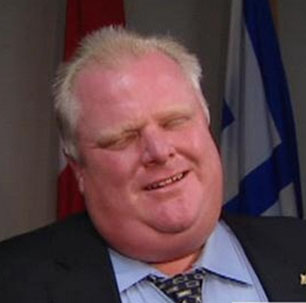 The heart of the matter is what Rob Ford did at a meeting of Toronto City Council February 7, 2012. At that meeting he spoke for, and voted in favour of, a motion that reversed a decision that Toronto City Council had made back in 2010. That was a decision that he be required to provide proof that he had returned $3,150 to lobbyists who had donated to his football foundation. The Integrity Commissioner had recommended to Council that they require Ford to return the donations because she found that Ford’s acceptance of the donations violated the City’s Code of Conduct.
The heart of the matter is what Rob Ford did at a meeting of Toronto City Council February 7, 2012. At that meeting he spoke for, and voted in favour of, a motion that reversed a decision that Toronto City Council had made back in 2010. That was a decision that he be required to provide proof that he had returned $3,150 to lobbyists who had donated to his football foundation. The Integrity Commissioner had recommended to Council that they require Ford to return the donations because she found that Ford’s acceptance of the donations violated the City’s Code of Conduct.
The legal action says that Ford shouldn’t have spoken or voted at the meeting because that motion involved his pecuniary interest and the Municipal Conflict of Interest Act says he can’t do that. I’ll refer to that piece of legislation as “the Act” from now on to save space.
So the legal action doesn’t seek to punish Ford for his violations of the City of Toronto’s Code of Conduct. It is really just about his speaking and voting at the meeting that decided to reverse the decision they had previously made about those violations.
The Act says that when a matter comes before Municipal Council concerning which a member of Council has “any pecuniary interest” that member must declare a conflict of interest and not speak to, or vote on, the matter. The member must also not attempt to influence the decision on the matter before or after the meeting.
The penalty for violating this provision and for not having an acceptable defence for doing so is severe. First, the member must be removed from office. Secondly, the member may be prevented from running again for up to 7 years; that’s up to the judge.
“Pecuniary” means money, so anything that could influence the member’s financial situation, and is not specifically exempted by the Act, falls into that category. Clayton Ruby, well known for his criminal defense work, is the lawyer for Paul Magder, the private citizen who brought the legal action against the Mayor.  Ruby argued that the Mayor had a pecuniary interest in the matter before Council on February 7 because he gained financially by avoiding having to pay the $3,150 back to the lobbyists. On the face of it that looks pretty convincing. It’s hard to argue that this is not a pecuniary interest. This is hot water indeed.
So what is Rob Ford’s defense? Ford’s lawyer, Alan Lenczner, made four arguments.
Argument 1: the Act does not Apply
 First Mr. Lenczner argued that the Municipal Conflict of Interest Act does not apply to the situation in question. The documents he filed state that the Act is concerned with City business and was not meant to apply to the matter before City Council on February 7. That matter had to do with a Council resolution dealing with Ford’s conduct (his violation of the City’s Code of Conduct) not City business.
First Mr. Lenczner argued that the Municipal Conflict of Interest Act does not apply to the situation in question. The documents he filed state that the Act is concerned with City business and was not meant to apply to the matter before City Council on February 7. That matter had to do with a Council resolution dealing with Ford’s conduct (his violation of the City’s Code of Conduct) not City business.
Further, Mr. Lenczner argued that Ford should be allowed to present his case to Council concerning why he should not be levied with the penalty of having to repay the lobbyists. Our notion of justice requires that people faced with a penalty should be able to argue their case before the body making the decision to invoke the penalty. But if avoiding the penalty is considered a pecuniary interest under the Act, then speaking about it before Council results in removal from office and the ability of Council members to make their case is effectively eliminated.
Clayton Ruby responded to Mr. Lenczner’s two-pronged argument. He said that the Act is not written in a manner which is consistent with Mr. Lenczner’s interpretation. The Act’s text just does not support Mr. Lenczner’s argument. As for Ford’s inability to present his case about the penalty, one of the lawyers from Mr. Ruby’s office argued that Mr. Ford would have the opportunity to do so if he brought a legal action for a judicial review of the decision.
I agree with Mr. Lenczner’s underlying argument here that the Act can’t be meant to apply to the situation. The Act, with its severe penalties (removal from office, etc.) was brought in to discourage corrupt practices by municipal politicians. The classic case is failing to reveal an interest in a property that is the subject of a zoning, purchasing or other decision before municipal Council. I think that’s the kind of pecuniary interest the Act was passed to deal with.
So I do not think that the Act was ever meant to apply to the situation facing the Mayor. I think that the Act should specifically say that it excludes matters involving the violation of municipal codes of conduct to avoid the problem of not permitting a member to speak to accusations and penalties.
The Act is quite detailed about situations to which it does not apply (11 are specified). But codes of conduct are not among them. Because it’s so detailed on the exclusions it’s hard to argue in law that the Act also meant to exclude members’ behaviour under the code of conduct.
I think the Act should be amended to remedy this problem which is a kind of legal “gotcha”. But that would take some time ; it’s not much help to the Mayor now.
Argument 2: The Amount of Money Involved Is Insignificant
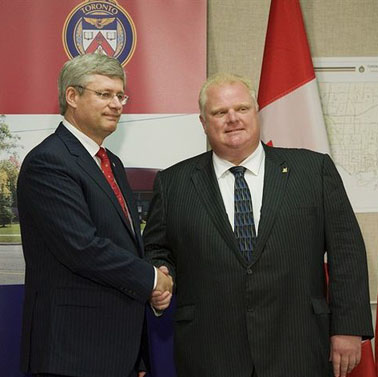 One of the 11 specified exemptions of pecuniary interest concerns its size: a pecuniary interest “which is so remote or insignificant in its nature that it cannot reasonably be regarded as likely to influence the member”. Alan Lenczner argued that $3,150 qualifies for this exemption, given the fact that the Mayor makes $167,770 in salary per year.
One of the 11 specified exemptions of pecuniary interest concerns its size: a pecuniary interest “which is so remote or insignificant in its nature that it cannot reasonably be regarded as likely to influence the member”. Alan Lenczner argued that $3,150 qualifies for this exemption, given the fact that the Mayor makes $167,770 in salary per year.
Mr. Ruby replied that cases decided under the Act run counter to this argument. Much lower amounts have been considered and found to constitute a pecuniary interest.
In addition, Mayor Ford made statements at the Council meeting in question that he didn’t see why he had to repay the $3,150 from his own pocket. So it was certainly something he was aware of and apparently, at least, the money involved influenced his decision to speak against the motion.
In light of previous court decisions and the Mayor`s statements, I don’t think this argument is particularly persuasive and I doubt that Judge Hackner will agree with Mr. Lenczner on this one.
Argument 3: Mayor Ford Made an Error in Judgment
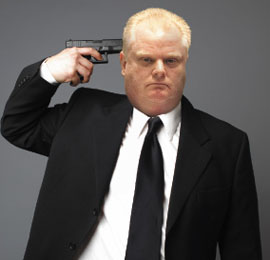 The Act specifies two acceptable defences to failing to declare a conflict of interest and speaking or voting him on a matter involving a pecuniary interest. If the member inadvertently failed to adhere to the Act or failed to do so through an error of judgment then the penalty will not apply and the member keeps his/her seat.
The Act specifies two acceptable defences to failing to declare a conflict of interest and speaking or voting him on a matter involving a pecuniary interest. If the member inadvertently failed to adhere to the Act or failed to do so through an error of judgment then the penalty will not apply and the member keeps his/her seat.
Mr. Lenczner argued that the Mayor should not be removed from office because, if he violated the Act, he did so on the basis of an honest misunderstanding of what the Act required in the situation.  He made an error of judgment.
The Mayor testified at length about this. He said that he understood the Act to apply only in situations where the City itself stood to gain or lose and the motion before the Council meeting, because it dealt with his conduct. He also said that he relied on advice of City staff to let him know when he was in a conflict situation and they didn’t tell him he had one. He pointed out that he frequently declared conflicts of interest on matters, including one that came before Council February 7, the very same day of the matter in question.
Clayton Ruby vigorously cross examined the Mayor. He asked him about his knowledge of the Act and his procedure for identifying matters that might involve a conflict of interest. The Mayor admitted that he had not read the Act or training materials provided by the City and did not attend training sessions. He had no set procedure for assessing whether or not he had a conflict in matters coming before Council. He relied on City staff, though he acknowledged that it was his responsibility to decide whether or not he was in a conflict situation.
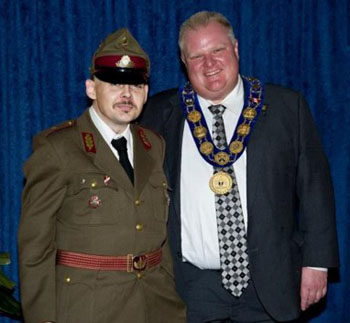 At the end of his cross-examination Clayton Ruby accused the Mayor of lying under oath, saying that he was tailoring his testimony to what he thought would get them off the hook.
At the end of his cross-examination Clayton Ruby accused the Mayor of lying under oath, saying that he was tailoring his testimony to what he thought would get them off the hook.
It was quite a show and did nothing for the Mayor’s image, unless Mr. Ford is attempting to polish his reputation for incompetence.
But competence may not be particularly relevant; credibility is. Without actually observing the testimony and cross-examination, it’s difficult to say what kind of impact this might have on Judge Hackland’s decision.
Argument 4: Council had no authority to require the $3,150 repayment
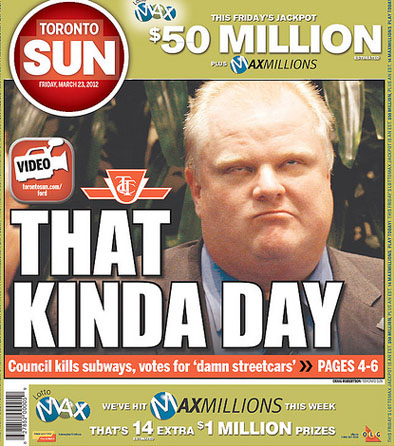 Alan Lenczner’s fourth argument was that Toronto Council had no authority to require the Mayor to repay the $3,150 in the first place. He said that since it didn’t have the authority to do that, the original motion passed in 2010 was outside the powers of Toronto Council, so the Council discussion of it on February 7, 2012 was really a discussion of something that did not exist in the law (a “nullity”). Because of this, the Municipal Conflict of Interest Act did not come into play and the Mayor was free to speak and vote without being subject to penalties under the Act.
Alan Lenczner’s fourth argument was that Toronto Council had no authority to require the Mayor to repay the $3,150 in the first place. He said that since it didn’t have the authority to do that, the original motion passed in 2010 was outside the powers of Toronto Council, so the Council discussion of it on February 7, 2012 was really a discussion of something that did not exist in the law (a “nullity”). Because of this, the Municipal Conflict of Interest Act did not come into play and the Mayor was free to speak and vote without being subject to penalties under the Act.
Why did Council lacked the authority to do this? Mr. Lenczner’s rationale was that Toronto Council is governed by the City of Toronto Act. He argued that Section 160(5) specifically sets out what penalties Council is authorized to impose on a member. It says that if the Integrity Commissioner makes a report to Council stating that in his or her opinion the member violated the Code of Conduct, then Council can either reprimand the member or suspend the member’s pay for up to 90 days. So under Section 160(5) there is no authorization to require Councillor Ford to repay the money.
This is an interesting issue. The action that the Integrity Commissioner recommended is actually included in the menu of possibilities specified in Toronto`s Code of Conduct itself.
The Code of Conduct was adopted by Toronto City Council. Under the part titled “Compliance with the Code of Conduct” there is a section “Other Actions” and it states that the Integrity Commissioner may recommend “the return or reimbursement of monies received”. Did the City have the authority to adopt that power for the Commissioner? Section 159 of the City of Toronto Act explicitly gives the Council authority to assign the Commissioner powers and duties and that was presumably where City looked for the authority to make “the return or reimbursement of monies received” one of the Commissioner’s powers.
So is there a conflict here with section 160(5), which specifies only the two penalties? Did Council have the power to require the return of the money, despite what section 160 (5) says?
This issue is not addressed in Mayor Ford’s legal materials. I suspect Mr. Lenczner dealt with it when he made his summary arguments to Judge Hackler on the second day of the proceeding.
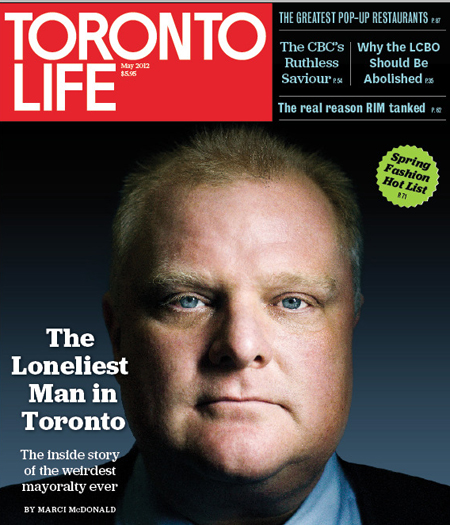 Looking more closely at the City of Toronto Act I can see an argument in favour of the view that section 160 (5) applies to the Mayor’s case, but the powers presumably derived from section 159 do not. That would obviously favour the Mayor. And his case is the first time a judge will be ruling on the penalties specified in the Code of Conduct
Looking more closely at the City of Toronto Act I can see an argument in favour of the view that section 160 (5) applies to the Mayor’s case, but the powers presumably derived from section 159 do not. That would obviously favour the Mayor. And his case is the first time a judge will be ruling on the penalties specified in the Code of Conduct
The reason for favouring the Mayor here is that all of section 160 applies when the Integrity Commissioner handles a complaint by conducting an inquiry (see section 160(1)). This is precisely what happened in 2010 when a private citizen brought the complaint against Mayor Ford’s use of City resources. The Commissioner conducted an inquiry and then submitted her report to Council.
For me, this is the argument that seems to offer the Mayor’s best chance. As far as I can make out, this issue has never been litigated, so Judge Hackland will be breaking new legal ground here, with all the uncertainty that goes with it.
Now I am anxiously awaiting the Judge Hackland’s ruling. In the meantime, I will be muttering “Go Rob Ford,” quietly urging him on to legal victory.
West Side Noel is a retired policy consultant and lawyer residing in Parkdale-High Park.
